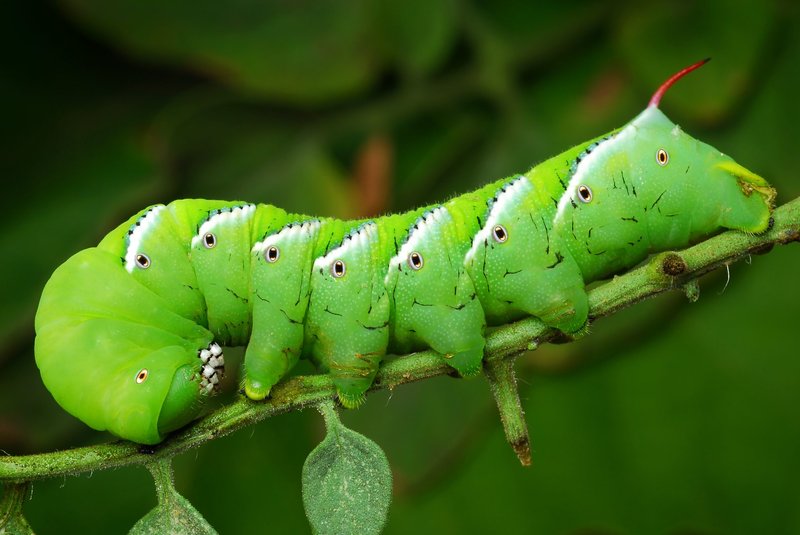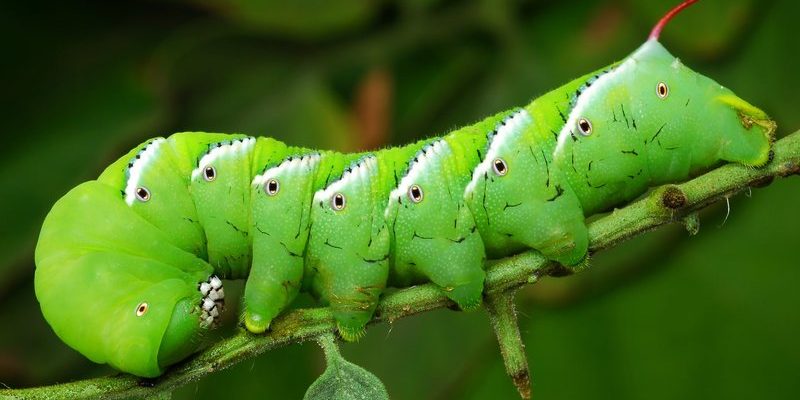
Hornworms are the larval stage of the moth species known as sphinx moths. They often appear in gardens during the warmer months when vegetables like tomatoes, peppers, and eggplants are in full swing. While they can be quite damaging, understanding their behavior and preferences can help you determine how to manage them effectively. Not every vegetable plant is a target for hornworms, but it’s crucial to know which ones are at risk and how you can protect them.
What Are Hornworms and Why Do They Matter?
Hornworms are large caterpillars, typically green in color, with a distinctive horn-like protrusion on their rear. They’re often found munching away on your plants, particularly favorites like tomatoes and peppers. Because they can grow quite large, they can destroy a significant amount of foliage and even entire plants in just a few days. A well-fed hornworm can eat more than you might expect—up to four times its body weight in a day!
You might be wondering why these guys are such a big deal in the gardening world. Well, if you’re trying to nurture your own vegetable patch, a hornworm infestation can lead to *serious crop damage*. This is especially important if you rely on your garden for healthy meals. Besides the direct damage, hornworms can also attract other pests and diseases, complicating your gardening efforts even further.
Which Vegetables Do Hornworms Prefer?
Hornworms can be picky eaters, but they have a few favorites that many gardeners should keep an eye on. Here’s a quick list of vegetables that hornworms particularly love:
- Tomatoes
- Peppers
- Eggplants
- Potatoes
- Tobacco (if you happen to grow it!)
If you grow any of these plants, it’s wise to check them regularly for signs of hornworm activity. A few nibbles might not seem like a big deal, but hornworms can multiply quickly. One female sphinx moth can lay hundreds of eggs, leading to a severe problem in no time.
Interestingly, not all vegetable plants attract hornworms. For example, leafy greens like lettuce or spinach tend to be less appealing. This fact can be useful if you’re trying to outsmart hornworms in your garden layout.
Signs of Hornworm Damage
Identifying hornworm damage early can save your plants from significant harm. So, what should you look for? Here are a few telltale signs that these pests might be making a meal out of your garden:
- Chewed Leaves: Look for large, irregular holes in the leaves of your plants. Hornworms are voracious and can strip foliage quickly.
- Droppings: You’ll often find green or black droppings on your plants or on the ground below. This can be a clear indication of their presence.
- Caterpillar Sightings: If you see large, green caterpillars hanging out on your plants, that’s a strong sign you have hornworms. They blend in well, so you might have to look closely.
If you catch these signs early, you can intervene before the hornworms do too much damage. It’s like reaching for a first aid kit when you get a small cut—better to address it before it becomes a bigger problem.
How to Control Hornworm Populations
Now that you know what to look for, let’s talk about how to deal with hornworms if they invade your vegetable garden. Here are some effective methods to keep them in check:
- Handpicking: If you spot them, simply pick them off your plants and drop them into a bucket of soapy water. It’s an easy and chemical-free solution!
- Biological Control: You can introduce beneficial insects, like parasitoid wasps, which lay eggs in hornworms. When they hatch, the larvae will eat the hornworm, helping to reduce their numbers.
- Plant Diversity: Growing different types of vegetables can deter hornworms since they tend to focus on a few favorites. Mixing in non-attractive plants can keep them guessing.
Using these methods, you’ll not only manage hornworm populations but also create a healthier ecosystem in your garden. It’s a little bit of extra work, but trust me—your plants will thank you!
Are Hornworms Dangerous to Other Plants?
While hornworms have their favorites, they generally won’t harm all vegetable plants. Most of the time, they stick to their preferred crops like tomatoes and peppers. However, it doesn’t mean that other plants are completely safe. For instance, hornworms might occasionally munch on potatoes and eggplants, but they’re not as focused on leafy greens.
What’s important to remember is that just because they might not destroy every type of plant doesn’t mean you should neglect your garden. If you’re serious about vegetable gardening, *watching for pests is crucial*, regardless of the type. A proactive approach will help ensure all your plants remain healthy and thriving.
Hornworms can be a gardener’s nightmare, but they’re not the end of the world. By knowing their habits, preferences, and how to identify them, you can keep your vegetable plants safe from harm. Sure, it takes a little effort to manage these pests, but your garden will flourish if you stay vigilant.
So, the next time you spot a hornworm, don’t panic. Use your gardening skills to handle the situation and protect your hard work. After all, the joy of harvest season is worth every bit of effort you put into your garden. Happy gardening!

